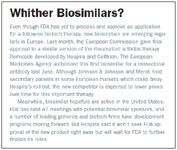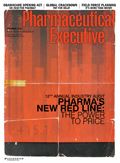Brand-Generic Wars Heat Up
Pharmaceutical Executive
Tension mounts over biosimilars, co-pay coupons, trade, and testing.
As revenues continue to be eroded by generic competition for numerous blockbuster drugs, pharma companies are ramping up efforts to delay marketing of copycat products and to protect new therapies moving through the pipeline. Brand manufacturers have to contend with insurers, payers, and drug plan operators, who eye increased generic drug use as key to cutting healthcare costs. And the Food and Drug Administration is under pressure to do all it can to speed new generic drugs to market.

Jill Wechsler
Contention has emerged on the international trade front, where generic firms are contesting pharma efforts to include hefty exclusivity provisions in the Trans-Pacific Partnership (TPP) agreement and other trade pacts. At home, discord has been mounting over actions by brand manufacturers to block access to drug supplies needed for bioequivalence testing by generics makers. Pharma companies point to risk evaluation and mitigation strategies (REMS) that impose strict controls on distribution of certain medicines, and that strategy seems to extend to products without limited distribution requirements. FDA officials have stated that REMS provisions are not intended to block generic drug development. Lawsuits are moving forward, with the Federal Trade Commission (FTC) supporting generic company claims that blocking access to test supplies violates antitrust laws.
Citizens' petitions and lawsuits continue to pit manufacturers against each other and FDA. Teva Pharmaceutical, for example, is appealing a recent court decision denying patent protection for its lead multiple sclerosis treatment Copaxone, which opens the door to generic competition in May 2014. Teva could retain market share longer if FDA requires full, placebo-controlled clinical trials on generic versions, which Teva says are needed to ensure the safety and immunogenicity of this hard-to-characterize product.
Similarly, GlaxoSmithKline faces generic competition for its asthma treatment Advair (fluticasone/salmeterol) following FDA publication of guidance last month for developing bioequivalent versions of this blockbuster inhaled powder. FDA calls for some clinical trials—in addition to in vitro and pharmacokinetic studies—to document bioequivalence. But Sanford Bernstein analyst Tim Anderson predicts generic versions of this lead Glaxo product by 2016, noting that FDA gives Sandoz and other generics firms three years to "iron out all the wrinkles" in their development programs.
FDA officials have come down hard on brand companies that file late or trivial citizens' petitions to delay generic drug approvals, as seen in its recent blast of Novartis for "misuse of the petition process" in seeking to block generic versions of bone-loss drug Reclast (zoledronic). The agency's harsh language, notes Hyman, Phelps, McNamara attorney Kurt Karst (fdalawblog.net, August 28, 2013), could fuel private litigation.
Countering coupons
Meanwhile, pharmacy benefit managers (PBMs) are working hard to promote generic drug use. The Pharmaceutical Care Management Association issued a report in May (2013) projecting $75 billion in savings for Medicaid pharmacy programs over the next decade from increased use of generics, as well as other formulary features; reduced pharmacy dispensing fees; and the formation of limited pharmacy networks.

Whither Biosimilars?
A prime target of payers and PBMS are co-pay coupons from innovator firms, which have become a popular alternative to drug samples for promoting new therapies. The coupons usually cover all or part of the patient's co-pay or coinsurance for a drug to equalize outlays for a new therapy compared to older brands or generics.
But the strategy is costly in the long run for plans and payers, according to a recent article in the New England Journal of Medicine (August 28, 2013) that analyzed some 374 brand-name medicines offering coupons, 62 percent facing competition from generics or cheaper brands. While patients may benefit greatly from coupons for essential life-saving medicines that have no alternatives, the authors note that insurers still have to pay the higher cost of the promoted medicine. And that can add up when patients with chronic conditions become reluctant to switch to a less expensive generic or brand once comfortable with the new drug.
Co-pay coupons are regarded as kick-backs in federal health programs, and the HHS Inspector General is examining whether Medicare Part D plans have sufficient safeguards in place to ensure that beneficiaries don't use them. The Senate Finance Committee also has examined whether coupons encourage beneficiaries to choose more expensive brand drugs over low-cost generics and thus cause Medicare to pay more than necessary.
Blocking biosimilars
An increasingly visible generic-brand battleground involves the details governing future generic versions of biotech therapies. Product "naming" remains a contentious issue, as biotech firms press for unique names on biosimilars to differentiate them from the innovator product. The companies claim that clear product identification is needed for accurate adverse event reporting and quality oversight. However, unique names also could discourage future product substitution if FDA deems the biosimilar interchangeable. Biotech manufacturers claim that no biosimilar will ever be the "same" as the reference product, and that interchangeability will not be feasible. But just to make sure, industry is pressing state legislatures to revise pharmacy laws to make it even more difficult for pharmacists to substitute a biosimilar for a brand.
The issue made headlines recently as the California legislature approved a bill that requires pharmacists to notify the prescribing doctor of a biosimilar substitution. Such legislation has been adopted in North Dakota and three other states, but most have sunset provisions that could limit their impact. Similar bills have died in 10 other states, but innovator firms continue to press for action across the country.
Jim Greenwood, president of the Biotech Industry Organization (BIO), claims that the California bill is necessary to safeguard the patients' right to know what treatments they receive, and that even very minor differences in production of a biologic can have an impact on individual response. Notification thus enables physicians to be aware of the precise course of treatment given any patient and, BIO says, is key to permitting future substitution of interchangeable biologics.
The Generic Pharmaceutical Association (GPhA) counters that notification requirements really aim to paint biosimilars as different and unsafe. The California Public Employees' Retirement System opposed the measure as likely to restrict consumer access to lower-cost biosimilars, and the Academy of Managed Care Pharmacy urged California's governor Jerry Brown to veto the bill for similar reasons.
FDA weighed in by noting that the agency has set high standards for approving an interchangeable biological product and that efforts to "undermine trust in these products are worrisome and represent a disservice to patients who could benefit from these lower cost treatments." With biologics predicted to account for eight of the top 10 drugs by 2016, the stakes are high.

Jill Wechsler is Pharm Exec's Washington correspondent. She can be reached at jwechsler@advanstar.com.

FDA Outlines Updated Requirement for Placebo-Controlled Trials in Vaccine Research
May 21st 2025In an article recently published by The New England Journal of Medicine, FDA higher-ups Vinay Prasad, MD, MPH; and Martin A. Makary, MD, MPH, wrote that any new COVID-19 vaccine must now be evaluated in placebo-controlled studies.
Navigating Distrust: Pharma in the Age of Social Media
February 18th 2025Ian Baer, Founder and CEO of Sooth, discusses how the growing distrust in social media will impact industry marketing strategies and the relationships between pharmaceutical companies and the patients they aim to serve. He also explains dark social, how to combat misinformation, closing the trust gap, and more.